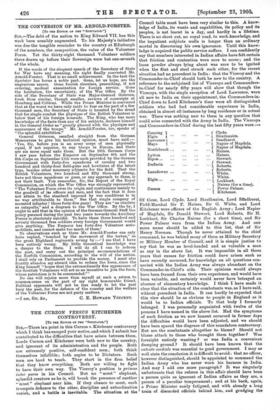SIR,—The debt of the nation to King Edward VII. has
this week been sensibly augmented. To his Majesty's initiative was due the tangible reminder to the country at Edinburgh of the numbers, the composition, the value of the Volunteer Force. Yet the thirty-eight thousand Volunteer soldiers there drawn up before their Sovereign were but one-seventh of the whole.
If the words of the eloquent speech of the Secretary of State for War have any meaning, the sight finally converted Mr. Arnold-Forster. That is no small achievement. In the task the Spectator has borne a noble part. Gone, let us hope, are the ungracious sneers. Gone foolish circulars, prescribing, if not ordering, medical examination for foreign service. Gone the hesitation, the uncertainty, of the War Office. By the side of ;the Secretary of State was Major-General Grierson, fresh from similar, though smaller, reviews of conscripts at Homburg and Coblenz. While the Prime Minister is convinced that at the worst we have only raids to fear on the part of a few thousand men, the Secretary of State is haunted by the dread that for single combat the physique of the British Volunteer is below that of his foreign comrade. The King, who has more knowledge of the facts than any of his subjects, declares himself in the General Order as greatly pleased with the physique and appearance of the troops." Mr. Arnold-Forster, too, speaks of "the splendid exhibition."
General Grierson, recalled straight from the German lIdanceuvres to give his technical opinion, must have said :— • Yes, Sir, before you is an army corps of men physically equal, if not superior, to any troops in Europe, and there are six more equal unto them. But the 18th German Corps I saw pass before the Emperor on September 8th and the 8th Corps on September 11th were each provided by the German Government with forty-five squadrons of cavalry and two hundred and thirty-four field-guns and howitzers of the latest type, besides other necessary adjuncts for the field. That the British Volunteers, two hundred and fifty thousand strong, have not these squadrons or guns, or any approach to them, is not their fault. You remember, Sir, the Report of the Royal CoMmission, on which the War Office was strongly represented. "The Volunteer Force owes its origin and continuance mainly to the goodwill of its officers and men, and the fact that it does not attain to the standard imposed by war conditions is in no way attributable to them." See that single company of mounted infantry ! those forty-five guns ! They are " as obsolete as catapults," and a disgrace to the War Office. By the by, I ought to add that in the opinion of the German General Staff the policy pursued during the past two years towards the Auxiliary Forces is absolutely suicidal. To have these three hundred and seventy thousand free soldiers every foreign Government would give anything. The Emperor has forty-five Volunteer auto- mobilists, and cannot make too much of them!
To observations such as these Mr. Arnold-Forster can only have replied, "touched by the movement of the tartan," as the great Highland regiments swung by :—` I see that I have been entirely wrong. My little theoretical knowledge was a danger to the State. I will do all I can to redeem the past, and carry out the principal recommendations of the Norfolk Commission, according to the will of the nation. I shall rely on Parliament to provide the money. I must also frankly abandon my absurd idea to reduce the force, since the King himself " hopes that the extraordinarily fine appearance of the Scottish Volunteers will act as an incentive to join the force, whose patriotism is to be commended."' No one will rejoice more than myself at such a return to common-sense on the part of my right honourable friend. Political opponents will not be less ready to let the past bury the past, for the defence of the country and the welfare of the Volunteer Force are not party matters.










































 Previous page
Previous page